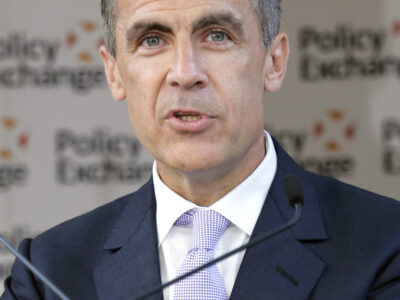Region: International
Worthwhile Canadian Initiative! Really!
McGill University’s Sustainability Academic Network provides a useful — and potentially crucial — new platform.
About a week ago I got an email from McGill University’s Juan Serpa, asking me to join a new platform — the Sustainability Academic Network (SUSAN) — that contains literally thousands of datasets, academic papers, conferences, jobs, grants, local events, and institutes all devoted to sustainability. Great. Happy to do it (especially since they found …
Continue reading “Worthwhile Canadian Initiative! Really!”
CONTINUE READINGBrazil Steps Ahead of the U.S. on Climate Policy
A new emissions trading system is a major step for Brazilian climate policy.
Hopefully, Brazil’s actions will encourage other countries, particularly in South America, to take similar actions. The EU and California have been leaders in this arena, but carbon trading systems are now beginning to get traction outside of the developed world in China and now Brazil. That’s an encouraging sign.
CONTINUE READINGThe Good, the Bad and the Utter Contempt
The Drain is a weekly roundup of climate and environmental news from Legal Planet.
The news this week has me remembering my grandpa teaching a young me to turn off the tap while brushing my teeth. (Hey, I was an ignorant East Coast kid.) This was in California’s Central Valley around 1990 when drought conditions flared and the federal government cut water deliveries. What was the news story? What …
Continue reading “The Good, the Bad and the Utter Contempt”
CONTINUE READINGThe Chutzpah is Stunning
The Trump Administration is suing to block state climate lawsuits based on Clean Air Act Preemption.
If nothing else, you have to give credit to the Trump Administration for incredible gall. Yesterday, the Department of Justice filed suit against Michigan and Hawaii seeking to stop those states from filing lawsuits against fossil fuel companies for climate damages. The fact that DOJ is seeking to prevent even the filing of the lawsuits …
Continue reading “The Chutzpah is Stunning”
CONTINUE READING100 Days of Fear & Loathing in Climate World
The Drain is a weekly roundup of climate and environmental news from Legal Planet.
Are you tired of the words “100 days”? “In his first 100 days the Trump administration has slashed federal agencies, canceled national reports, and yanked funding from universities,” Grist puts it. “One hundred days of anti-environmental mayhem,” says Dan Farber at Legal Planet. My UCLA colleague Ann Carlson is quoted by the New York Times …
Continue reading “100 Days of Fear & Loathing in Climate World”
CONTINUE READINGThe Politics of Geoengineering Are Getting Stranger
Of all the pollution threats out there, why are state lawmakers and U.S. EPA targeting solar geoengineering?
There are strange things happening in Climate World, in addition to all the horrifying things. Among the strangest is a surge in state bills to prohibit solar geoengineering. Just as strange is the recent shot across the bow by Trump’s EPA Administrator Lee Zeldin against one tiny startup firm that claims to be doing geoengineering. …
Continue reading “The Politics of Geoengineering Are Getting Stranger”
CONTINUE READINGCanada’s Election: Real Stakes for the Planet
Despite cynical criticisms of no differences between the parties, Carney and the Liberals are an obvious choice.
Nearly four decades ago, New York Times columnist Flora Lewis penned a piece, entitled “Worthwhile Canadian Initiative,” that became infamous in journalistic lore: The New Republic crowned it as the World’s Most Boring Headline because all three words were extremely boring. No more. Donald Trump’s demented economic war against America’s largest trading partner, and his …
Continue reading “Canada’s Election: Real Stakes for the Planet”
CONTINUE READINGDay After Earth Day, the Climate Pope, and the 89%
The Drain is a new weekly roundup of climate and environmental news from Legal Planet.
Environmental journalists everywhere are breathing easier this morning. They made it through Earth Day — one of two insufferable seasons of cliche, inane PR pitches clogging their inboxes. (The other? The 2-week UN Climate Conference each fall.) Environmental advocates are breathing a little easier too, because the White House blinked first in the war of …
Continue reading “Day After Earth Day, the Climate Pope, and the 89%”
CONTINUE READINGMAGA vs NOAA, Executive Orders, and Growing IRA Support
The Drain is a new weekly roundup of climate and environmental news from Legal Planet.
Trump wants to “Make Weather a Mystery Again.” The news that started leaking last Friday is that the Trump administration wants to break up the National Oceanic and Atmospheric Administration and essentially end NOAA’s climate work by abolishing its primary research office and forcing the agency to instead help boost U.S. fossil fuel production, according …
Continue reading “MAGA vs NOAA, Executive Orders, and Growing IRA Support”
CONTINUE READINGIntroducing Your Legal Planet Weekly Roundup
The L.A. Times Boiling Point is ending its informative weekly news roundups. Here’s your weekly Legal Planet roundup, The Drain.
Good morning! The L.A. Times fantastic Boiling Point column is ending its weekly news roundups of environmental and climate stories. As columnist Sammy Roth noted in his message to readers, “reading and analyzing so many news stories every week takes up an enormous amount of time and energy.” No kidding! I produce something similar for …
Continue reading “Introducing Your Legal Planet Weekly Roundup”
CONTINUE READING









